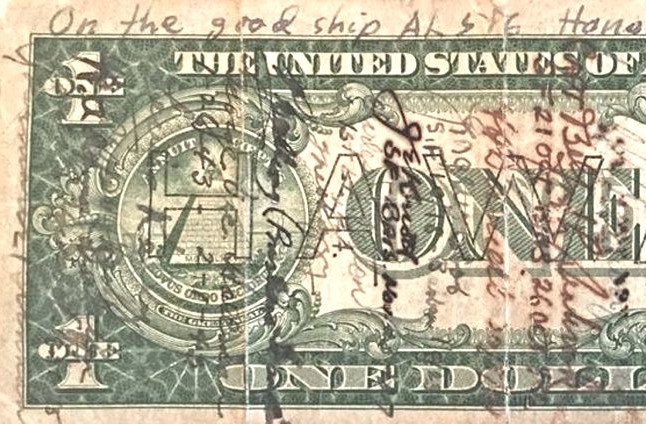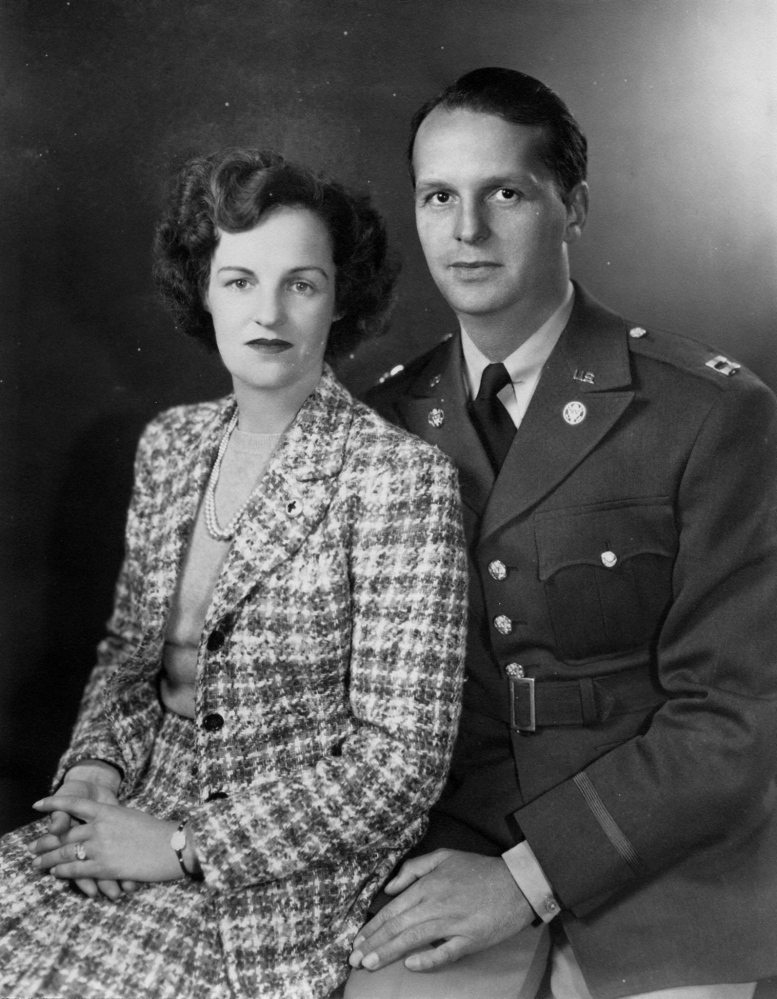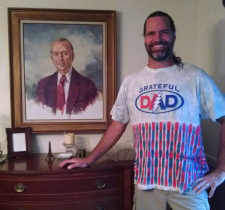The world can seem to be an awfully big place, but then there are some stories that make it feel very small.
The story of Rebecca Blaesing and a dollar bill is one such example.
Blaesing, now a freelance graphic designer living in Cumberland, was working in 1993 at Victory Deli in Portland when a co-worker set aside an unusual dollar bill. It was covered with signatures, and written around the border on the back of the bill was a curious line – “On the good ship AL516 (or 86) Honolulu Oct 29 1942 short snorter Bob Scull.”
Blaesing, intrigued, bought the bill from the co-worker for $5.
“I knew it was something special,” she said, but just what that was eluded her for years. She would come across the bill from time to time and then set it aside.
She learned a few things over the years, including that “short snorters” were something of a wartime fad. Military buddies would sign dollar bills and occasionally challenge one another to produce the bill. If one of the signers didn’t have his, he had to buy a drink for the signer or signers who did.
The bill bought by Blaesing has the word “HAWAII” emblazoned across the back, a wartime measure that would allow U.S. officials to invalidate any currency that fell into Japanese hands.
Blaesing couldn’t make heads or tails out of most of the signatures, some of which had faded to the point they could no longer be read.
She came across the bill again this month and could make out “zzy” in one of the signatures. She had a friend, Jen Pozzy, in Portland and thought it might be worth it to see if there was a connection, given that “zzy” to end a name was a little unusual.
Jen Pozzy told her yes, her husband’s grandfather, Theo Pozzy, had been in the war.
“I started getting a little lightheaded,” said Blaesing, who quickly sent the Pozzy family a jpeg image of the bill.
“I saw it and said, ‘Yes, I recognize that signature,” said Alex Pozzy of Portland. In fact, he said, it looked like the signature of his brother, who idolized Theo Pozzy and emulated his signature from examples on family papers. Pozzy noted that the entire family recognized their grandfather as a hero – an oil portrait of him hangs in Alex Pozzy’s dining room.
Blaesing turned the bill over to the Pozzy family Saturday. In another bit of fortuitous timing, the Pozzy family will be having a get-together in Maine this week, so other family members will get a look at the bill.
Pozzy said his grandfather was originally from France. He came to the U.S. in 1919 and later moved to Bangor. After enlisting in the Army with the rank of captain, he spent three years in the Pacific Theater during World War II as head of the Quartermaster Corps, distributing food under the command of Gen. Douglas MacArthur. He was discharged after the war with the rank of colonel.
Theo Pozzy helped implement the Marshall Plan to rebuild post-war Europe and was awarded the Medal of the Legion of Honor by President Charles DeGaulle of France. Pozzy returned to Bangor in 1954 and became president of an electrical contracting company. He was a well-known volunteer in the Bangor area and died in 1995 at the age of 94.
Alex Pozzy said that solving one part of the mystery of the bill doesn’t answer all the questions that surround it.
For instance, the family has no idea how it came to be circulating around Portland 22 years ago – 51 years after it was signed in Hawaii.
“People are dumbfounded by it,” he said.
Blaesing said she, too, has the same question, but recognizes that an answer may never come.
“I’m not sure how it got into circulation. That’s a real puzzling part of it,” she said. “We may never know. But I can let that go.”
As for the other circumstances – her friendship with Jen Pozzy, the timing of the family reunion and even the upcoming 70th anniversary of the end of the war with Japan – Blaesing thinks some greater power may have been involved for all those pieces to fall together.
“I just felt that Theo Pozzy was somewhere laughing,” she said. “I wouldn’t doubt if he intervened a little. It’s just too much.”
Send questions/comments to the editors.






Success. Please wait for the page to reload. If the page does not reload within 5 seconds, please refresh the page.
Enter your email and password to access comments.
Hi, to comment on stories you must . This profile is in addition to your subscription and website login.
Already have a commenting profile? .
Invalid username/password.
Please check your email to confirm and complete your registration.
Only subscribers are eligible to post comments. Please subscribe or login first for digital access. Here’s why.
Use the form below to reset your password. When you've submitted your account email, we will send an email with a reset code.